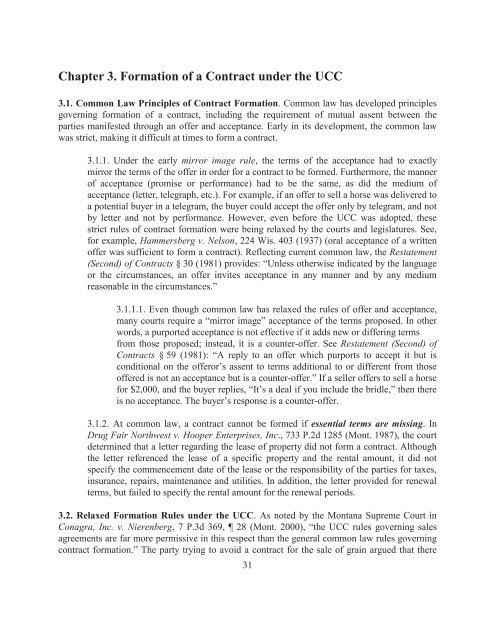Sales and Leases - A Problem-based Approach, 2016a
Sales and Leases - A Problem-based Approach, 2016a
Sales and Leases - A Problem-based Approach, 2016a
You also want an ePaper? Increase the reach of your titles
YUMPU automatically turns print PDFs into web optimized ePapers that Google loves.
Chapter 3. Formation of a Contract under the UCC<br />
3.1. Common Law Principles of Contract Formation. Common law has developed principles<br />
governing formation of a contract, including the requirement of mutual assent between the<br />
parties manifested through an offer <strong>and</strong> acceptance. Early in its development, the common law<br />
was strict, making it difficult at times to form a contract.<br />
3.1.1. Under the early mirror image rule, the terms of the acceptance had to exactly<br />
mirror the terms of the offer in order for a contract to be formed. Furthermore, the manner<br />
of acceptance (promise or performance) had to be the same, as did the medium of<br />
acceptance (letter, telegraph, etc.). For example, if an offer to sell a horse was delivered to<br />
a potential buyer in a telegram, the buyer could accept the offer only by telegram, <strong>and</strong> not<br />
by letter <strong>and</strong> not by performance. However, even before the UCC was adopted, these<br />
strict rules of contract formation were being relaxed by the courts <strong>and</strong> legislatures. See,<br />
for example, Hammersberg v. Nelson, 224 Wis. 403 (1937) (oral acceptance of a written<br />
offer was sufficient to form a contract). Reflecting current common law, the Restatement<br />
(Second) of Contracts § 30 (1981) provides: “Unless otherwise indicated by the language<br />
or the circumstances, an offer invites acceptance in any manner <strong>and</strong> by any medium<br />
reasonable in the circumstances.”<br />
3.1.1.1. Even though common law has relaxed the rules of offer <strong>and</strong> acceptance,<br />
many courts require a “mirror image” acceptance of the terms proposed. In other<br />
words, a purported acceptance is not effective if it adds new or differing terms<br />
from those proposed; instead, it is a counter-offer. See Restatement (Second) of<br />
Contracts § 59 (1981): “A reply to an offer which purports to accept it but is<br />
conditional on the offeror’s assent to terms additional to or different from those<br />
offered is not an acceptance but is a counter-offer.” If a seller offers to sell a horse<br />
for $2,000, <strong>and</strong> the buyer replies, “It’s a deal if you include the bridle,” then there<br />
is no acceptance. The buyer’s response is a counter-offer.<br />
3.1.2. At common law, a contract cannot be formed if essential terms are missing. In<br />
Drug Fair Northwest v. Hooper Enterprises, Inc., 733 P.2d 1285 (Mont. 1987), the court<br />
determined that a letter regarding the lease of property did not form a contract. Although<br />
the letter referenced the lease of a specific property <strong>and</strong> the rental amount, it did not<br />
specify the commencement date of the lease or the responsibility of the parties for taxes,<br />
insurance, repairs, maintenance <strong>and</strong> utilities. In addition, the letter provided for renewal<br />
terms, but failed to specify the rental amount for the renewal periods.<br />
3.2. Relaxed Formation Rules under the UCC. As noted by the Montana Supreme Court in<br />
Conagra, Inc. v. Nierenberg, 7 P.3d 369, 28 (Mont. 2000), “the UCC rules governing sales<br />
agreements are far more permissive in this respect than the general common law rules governing<br />
contract formation.” The party trying to avoid a contract for the sale of grain argued that there<br />
31


















